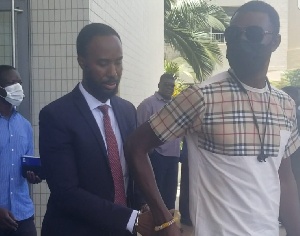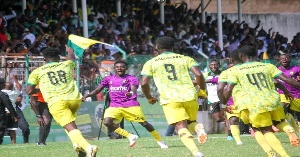- Home - News
- Elections 2024
- News Archive
- Crime & Punishment
- Politics
- Regional
- Editorial
- Health
- Ghanaians Abroad
- Tabloid
- Africa
- Religion
- Photo Archives
- Press Release
General News of Wednesday, 7 May 2025
Source: www.ghanawebbers.com
Adu-Boahene memo claims NSB spent GH₵8.3m on ‘opposition party’ ahead of 2024 election
A confidential memo from former NSB Director-General Kwabena Adu-Boahene reveals high spending on national security.
He claims GH₵8.3 million was spent on "communications equipment" for an opposition party. Additionally, nearly GH₵1 million was paid to MPs for passing key security laws.
Last week, an Accra High Court remanded Mr. Adu-Boahene in EOCO custody for seven days. This allows the Attorney General's office to complete witness statements.
Attorney-General Dominic Ayine has charged him and his wife, Angela Adjei Boateng, with corruption. The total amount involved is GH₵49 million.
They face 11 charges alongside two others, Mildred Donkor and Advantage Solutions Limited. Charges include stealing, money laundering, and causing financial loss.
The leaked document details covert transactions from 2020 to 2024 under "Special Operations." It raises questions about state fund misuse and political interference in elections.
The memo shows GH₵8.3 million was allocated in September 2024 for communications equipment for an unnamed opposition party. This was justified as ensuring "Stability of Nation/National Cohesion/Political Impartiality."
It also states that GH₵960,000 was paid to the Defence and Interior Committee in 2020/2021 as allowances for enacting the National Signals Bureau Act. An additional GH₵309,000 went to the Subsidiary Legislation Committee in 2024.
Election-related expenditures exceeded GH₵14 million. This includes GH₵7.2 million for the December 2020 polls and GH₵6.7 million for December 2024 elections.
Documents reveal that GH₵5.1 million was spent on luxury vehicles in December 2024 for a "Special Aide to the President-Elect."
Security operations received significant funding: GH₵9.5 million for cyber surveillance solutions and GH₵6.9 million for Operation Conquered Fist counter-terrorism efforts from 2020-2024.
Mr. Adu-Boahene remains detained by EOCO but insists these were legitimate national security expenses. His memo questions how public funds could be stolen without Auditor-General intervention.











